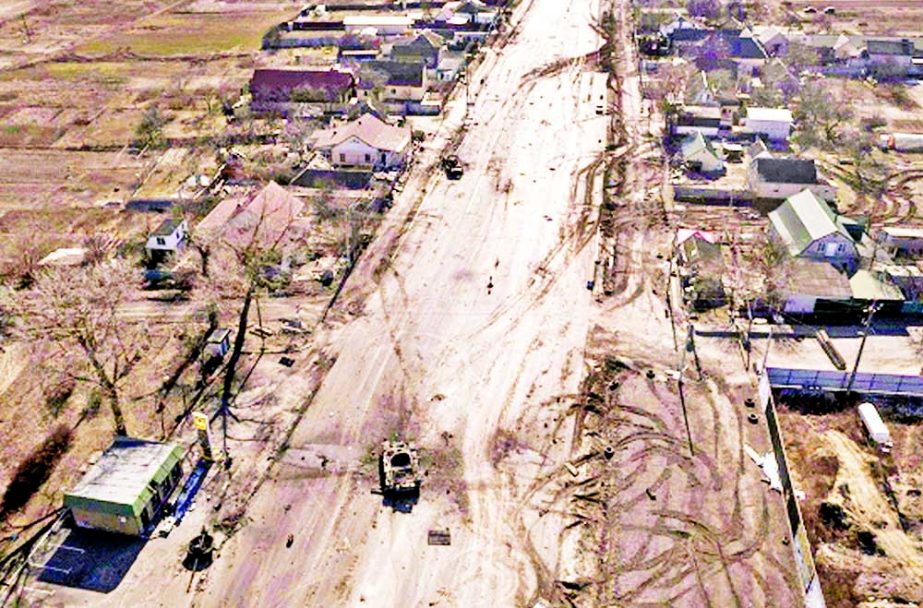
New Nation Report :
As the invasion drags on for more than three weeks, Russia’s economy which is smaller than those of India and South Korea is not only being ravaged, but also its military costs are escalating exponentially.
“The Russian people will always be able to discern true patriots from filth and traitors, and will simply spit them out like an insect in their mouth into the street,” President Vladimir Putin said in a televised speech to his nation on Wednesday. The statement just shows the regime’s frustration with the military progress being made in the war and the mounting pressure of Western economic sanctions.
According to Western estimates, as many as 7000 Russian personnel have died, the Wall Street Journalreported this week. A Western official and Ukrainian military reports stated, the deceased included four Russian generals-one-fifth of the number expected to be in Ukraine-along with other top commanders. Western sources also confirmed, the generals were close to the front lines, indicating that lower levels in forward units were likely unable to make judgments or were afraid of advancing.
Oryx Blog, an open-source blog that analyzes military-equipment losses, stated that Moscow’s forces have lost more than 230 of the heavily armored tracked vehicles since invading Ukraine on February 24. Many people were killed. Oryx claims that others were abandoned, taken, or damaged.
Ukraine’s government made further claims to have destroyed more than 400 Russian tanks and many less-armored military vehicles.
While Ukraine claimed to have shot down more than 80 fixed-wing planes and 100 helicopters, only a small number of these assertions have been independently validated. Western diplomats were surprised that Russia did not use its greater air strength to achieve air supremacy, leaving Ukraine’s considerably smaller air force to operate. Traditional military hardware utilized by Russia and other major international powers is proving ineffectual in Ukraine. Bangladesh’s top export destination, the United States, which accounted for $8.303 billion in our exports last year, said this week that it would send Ukraine with additional $800 million in weaponry, including several of the tank-busting missiles that have proven so deadly against Russian armor. 2,000 Javelins and 7,000 other antitank weapons are included in the package. The US has also announced the delivery of 100 lethal Switchblade drones.
People who have lost their jobs in Russia have been seen demonstrating in various parts of the country. These jobs were lost as a result of economic sanctions and shutdown, caesura, or partial freeze in operations of global brands such as McDonalds, Starbucks, Heineken, Swatch, Zara, Samsung, McKinsey, Accenture, Netflix, Visa, Mastercard, American Express, Jaguar Land Rover, General Motors, and Rolls Royce.
The Russian Central Bank, which had earlier hiked the interest rate to 20% to defend the sinking ruble, said yesterday (Friday, March 18) that it will maintain its high interest rate policy indefinitely. On Thursday, the Russian ruble, which has lost 38% of its value since the war began, closed at 104 to the US dollar.
Failure to pay, or paying in local currency instead of dollars, according to Bloomberg, would set off a potential wave of defaults on nearly $150 billion in foreign-currency debt owed by the government and Russian corporations such as Gazprom, Lukoil, and Sberbank.
Summer in Europe officially ends on March 20th this year. It remains to be seen whether US-led sanctions extend to Russian oil and gas, the country’s lifeblood. Even without any restrictions on Russian oil, there has been a dramatic drop in demand as merchants shied away from the nation due to the uncertainty.
According to the Bangladesh Embassy Site in Moscow, Russia is a small but vital commercial partner of Bangladesh, accounting for $548 million in exports and $653 million in imports in the 2018-2019 fiscal year. Bangladesh’s government is already taking steps to ensure that crucial items be imported in order to preserve agriculture production and exports using alternate payment channels.
In addition, Russia is financing90% of the $12.65 billion being spent on the construction ofRooppur Nuclear Power Plant, which has a capacity of 2,400 MW. Bangladesh however is not at risk of a power crisis if the nuclear project is halted due to Western sanctions because it already has over 40% excess capacity in the power sector and new LNG-based power plants in the pipeline.

